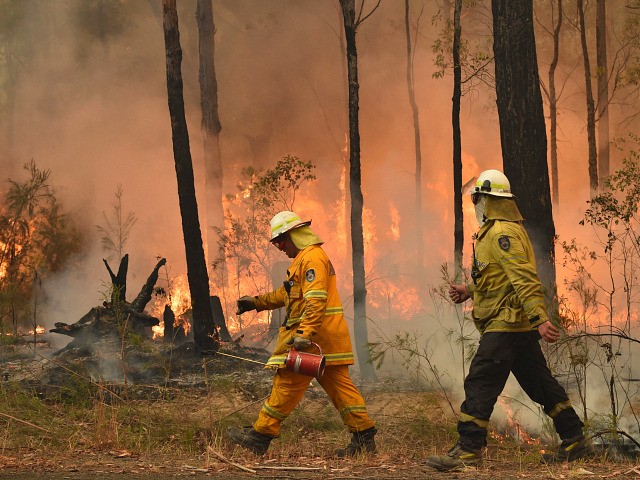The “apocalyptic” scenes of raging Australian bushfires will become commonplace around the world without a major drop in emissions, the Guardian newspaper warned Tuesday.
The Guardian, which has publicly pledged “to give global heating, wildlife extinction and pollution the urgent attention and prominence they demand,” insisting that the climate emergency is “the defining issue of our times,” has amped up its climate agitation by suggesting that Australian wildfires is the new normal.
Despite the fact that the “area of land burned around the world has decreased in recent years,” Guardian environment correspondent Fiona Harvey confidently writes that if current emission levels are maintained we can expect burning everywhere.
Citing one of the Guardian’s favorite climate “experts,” Richard A. Betts, head of the Climate Impacts strategic area at the Met Office Hadley Centre in Exeter, Harvey says that Australia’s fires would be normal if global temperatures were to rise by 3ºC above pre-industrial levels.
Betts, who along with others has pushed for an intensification of climate rhetoric, such as replacing “global warming” with “global heating,” said that Australia is “a sign of what would be normal conditions in a 3C world. It tells us what the future world might look like.”
“This really brings home what climate change means,” he said.
Beyond a rise of 2ºC “the impacts of climate breakdown are likely to become catastrophic and irreversible,” Harvey declares, “yet current global commitments to cut greenhouse gas emissions under the Paris agreement are estimated to put the world on track for 3C of heating.”

A Royal Australian Navy MH-60R Seahawk ‘Romeo’ Helicopter departs HMAS Adelaide during Operation Bushfire Assist, on January 5, 2020 at Sydney, Australia. HMAS Adelaide departed Sydney to assist with bushfire evacuations on the South Coast of New South Wales. Army Reserve forces and other specialist capabilities have been called in to help with firefighting efforts across Australia, along with extra Defence ships and helicopters. (ABIS Thomas Sawtell / Australian Department of Defence via Getty)
The “extreme bushfires in Australia showed what climate change would mean in reality,” Harvey writes, citing Betts.
“It is getting worse all the time,” Betts said. “The sooner we rein back emissions, the sooner we can slow the increase.”
Last May, the Guardian announced it had updated its official in-house style guide to turn up the heat on its climate change rhetoric, adopting new terminology meant to alarm readers and motivate them to action.
“Instead of ‘climate change’ the preferred terms are ‘climate emergency, crisis or breakdown’ and ‘global heating’ is favoured over ‘global warming,’ although the original terms are not banned,” the article stated.
“The phrase ‘climate change,’ for example, sounds rather passive and gentle when what scientists are talking about is a catastrophe for humanity,” said Katharine Viner, the Guardian’s editor-in-chief and a firm believer in the impending climate apocalypse.
The Guardian also declared it would no longer refer to those who question reigning beliefs regarding anthropogenic climate change as “climate skeptics” but will attempt to discredit them with the label “climate deniers.”

COMMENTS
Please let us know if you're having issues with commenting.